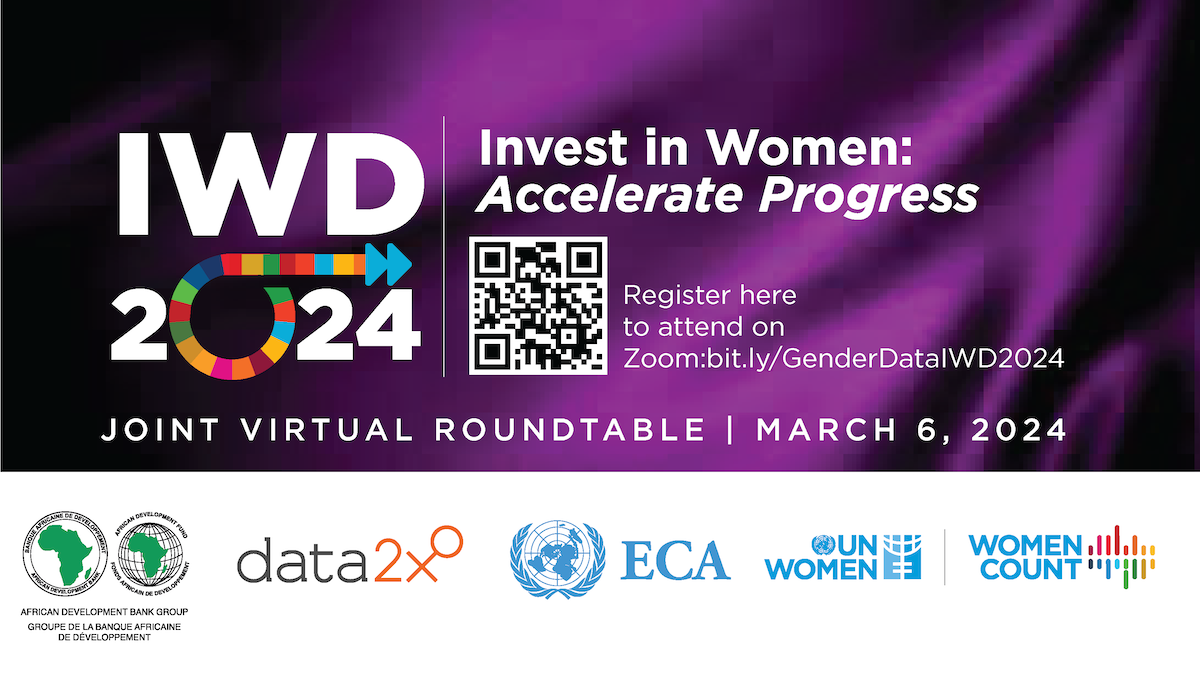African and Arab States Experts: Rev Up Investment in Gender Data to Accelerate Progress for All
Date:

Africa and Arab States, 8 March 2024. Public sector, civil society, international development, and media leaders from Africa and Arab States convened for a pre-International Women’s Day 2024 roundtable discussion on gender data as a catalyst for progress towards regional and global goals.
Celebrated annually on 8th March, this year’s International Women’s Day themed Invest in Women: Accelerate Progress recognizes the importance of investing in women through diverse approaches to accelerate social and economic progress and sustainable development for all.
Experts from finance and gender ministries in Morocco, Uganda, Senegal, Rwanda, Cameroon, led discussions that threw the spotlight on how countries are revving up investments in both producing and using gender data for accelerated social and economic development.
“Gender data is crucial for understanding the realities of women, girls and gender diverse communities, measuring progress on gender equality, and achieving the Sustainable Development Goals,” said Krista Baptista, Executive Director of Data 2X, a global gender data alliance.
However, gaps remain and chronic underinvestment in gender data still poses a significant challenge, particularly in the post-COVID context and in conflict-affected settings.
“Globally, an estimated $500 million is needed annually to adequately fund core gender data systems by 2030,” said Baptista.
Despite rising support for gender equality, global financing for gender data dropped by more than half (55 percent) in 2020. This gap jeopardizes progress as more than 25 percent of SDG indicators for gender equality are off track.
“There is also need for enhanced collaboration between gender data producers and the media as important disseminators of this information,” said John Allan Namu, award-winning journalist and founder/CEO of Africa Uncensored, an indigenous investigative journalism media house.
“More nuanced data that goes beyond raw numbers is also needed to better understand the state of women and girls,” said Christine Mungai, Senior producer for CNN As Equals and Lead Curator at Baraza Media Lab.
African countries and Arab States are more alive than ever to these challenges with a growing move to unlock the power of gender data to expedite progress towards the SDGs, Agenda 2063−Africa’s development blueprint−and other regional and national development priorities.
For instance, Morocco’s Center of Excellence for Gender-Responsive Budgeting (GRB) has pioneered in gender responsive planning and budgeting.
”The Center leads and promotes progressive GRB learning and links regional, national, and global GRB stakeholders,” said Ben-Nasar Boularbah, Head of Gender-Responsive Budgeting at Ministry of Finance.
Several other countries are also using gender data to link public spending to economic decisions that benefit women, girls, and society as a whole.
“Uganda has benefitted immensely from the use of gender and equity responsive budgeting as a tool for promoting inclusive growth,” said Margaret Kakande, Head of Budget Monitoring and Accountability at the Ministry of Finance, Planning, and Economic Development.
The country has achieved parity in primary education enrolments and completion between girls and boys, thanks in part to the use of gender data in policy and decision-making for the education sector.
“This progressive kind of budgeting calls for political commitment as well as incentives and sanctions, but Uganda’s experience shows that it is well worth the investment,” said Kakande.
Rwanda’s use of gender data to address gender-based violence (GBV) is also telling; gender data heavily informed the revision of the National Policy against Gender-Based Violence 2011.
“Rwanda’s Vision 2020 and Vision 2050 highlight the crosscutting nature of gender and inclusiveness for successful implementation,” said Rurihose Florien, Deputy Chief Gender Monitor, Rwanda Gender Monitoring Office.
“Effectively addressing GBV is therefore central to our national development priorities, and we cannot do this without gender data,” said Florien.
Experts also delved into the increasing need to transition to what is referred to as a “care society”. This involves accounting for the time that both women and men spend on paid work versus unpaid care and domestic work and implementing policies to better manage this time for economic and social growth.
“The Time Use Study inspired reflections on how to reframe Senegal’s Women’s Work Reduction Programme,” said Ms. Sadio Kanouté, Head of Gender Statistics and Studies Office at Ministry of Gender.
“The Ministry is considering how to integrate modern tools such as solar energy and childcare to reduce the burden of women’s unpaid work,” said Kanouté.
“The role of gender data in developing effective policies cannot be overstated,” said Antonia Ngabala-Sodonon, UN Women Special Representative & Head of Liaison to the African Union Commission, and the UN Economic Commission for Africa.
“Evidence-based policies and decisions are imperative in breaking the status quo of inequalities that prevent girls and women from realizing their full potential,” said Ngabala-Sodonon.
ENDS
For more information, please contact:
|
UN Women East and Southern Africa Ms. Lilian Muendo Communications Specialist
Ms. Sylvia Maina Gender Statistics Communications Specialist |
UN Women West and Central Africa Ms. Rokhaya Diongue Ngom, Gender Statistics Communications Specialist UN Women Regional Office for Arab States Ms. Montira Narkvichien Communications Specialist, |
African Development Bank (AfDB) Ms. Desiree Bataba Communications Specialist
UN Economic Commission for Africa (ECA) Ms. Mercy Wambui Chief, Communications and Media Relations Section |